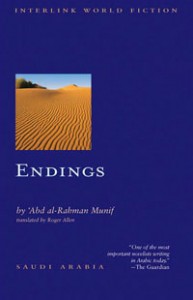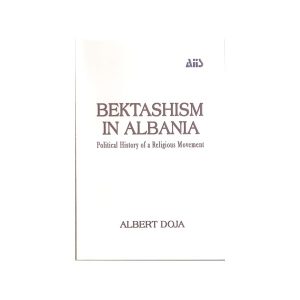The fictitious village of al-Tiba is located somewhere near the desert, probably in Saudi Arabia, although it might be almost anywhere in the Arabian peninsula.
Life in this region depends on the availability of water. And since several years, the usual rainfalls become less and less and this is a real threat for the survival of the village and the people. The drought is not a temporary problem but a permanent danger and has become the trigger for changes, changes that are described in Abd al-Rahman Munif’s novel Endings:
“Drought. Drought again! When drought seasons come, things begin to change. Life and objects change. Humans change too, and no more so than in their moods.”
The novel consists of three parts. The first part gives a general description of the village life, the second part introduces the main character, Assaf the hunter and the other characters, such as the Mukhtar (head of the village) and Abu Zaki, the carpenter. But also animals play a great role in this novel. There is Assaf’s hunting dog, and there are the animals that are hunted by Assaf and the other villagers and occasional guests from the city.
Assaf is a loner, a person that is considered as odd by the villagers and that is the subject of ridicule and jokes. But on the other hand everybody in the village appreciates his skills as a hunter. Assaf tries – without big success – to explain to the other villagers and the people that come sometimes from the city to kill wild animals that it is important to hunt only when there is a need. Assaf understands the concept of sustainability, contrary to the the other villagers and the city folk.
During the drought period, game becomes practically the only food source. Now the villagers get closer to Assaf and want to embark on a big game hunt together with some visitors from town. A terrible sandstorm leads to a catastrophe: Assaf (together with his dog) gets killed. The depressed villagers take his body home and – this is the third part of the book – during a vigil for Assaf they tell each other stories (which are based on classical Arabic stories), that reflect the life of animals and more rarely men in the village.
After Assaf’s funeral, a group of the men, headed by the Mukhtar, drives to the city to lobby for the construction of the dam that was promised to them a long time ago. Without the implementation of this project, al-Tiba seems to be doomed.
The book is for various reasons remarkable. Endings is told by an omniscient narrator in a quite impersonal style. Very few of the characters have really individual traits. The village and the desert seem to be the true main characters of the novel, and the animals have at least the same importance for the story as the people.
Munif describes the deep difference between the city and village culture, and although he seems to sympathize with the villagers, he obviously doesn’t put much hope in them. This becomes clear when he describes how they look at the living Assaf, whom they consider as at least odd, or even half crazy. And that not only because of Assaf’s obvious preference for a solitary life in the desert and on the hunting grounds, but also because they fail to see Assaf’s point about the use of the resources the village has. Over-usage can and will destroy the village in the end, unless the villagers change their minds.
For a moment, under the deep impression of Assaf’s tragic death and the night they spent to honor him, the villagers wake up from their usual lethargy. Whether they will be successful with their intervention in the city in order to lobby for the construction of the dam, Munif doesn’t tell us. But his own experience as an economist in Saudi Arabia, and later in other Arabic countries, made him very pessimistic.
Abd al-Rahman Munif was born 1933 in Amman, Jordan, where he also grew up. Later he studied law in Baghdad, and oil economics in Belgrade. He held high positions in the oil industry in Saudi Arabia and Iraq, published several books on the nationalization of the Arab oil industry and was chief editor and publisher of the influential journal al-Naft wa-l-Tanmiyah (Oil and Development). But his open criticism of Saudi Arabia resulted in his being stripped of Saudi citizenship and also his return to Iraq was blocked for the same reason, his criticism of those in power.
After that Munif embarked on a career as full time writer, mainly living in Paris. He published fifteen novels, among them the series Cities of Salt, a monumental quintet that can be seen as the arguably most remarkable work of modern Arabic fiction. In 2003, one year before he died, Munif published a book Notes on History and Resistance, in which he recalled the Iraqi uprising against Britain in 1920 and that ended with the infamies of the recently returned collaborators of the world’s only superpower – in Munif’s words
‘the most ignominious and shameless opposition of the world, a collection of kiosks selling lies and illusions’.
Since that time, things have gone even worse. Munif’s books haven’t lost their urgency and literary power and strength.

Abd al-Rahman Munif: Endings, transl. Roger Allen, Interlink Books, Northampton 2007
© Thomas Hübner and mytwostotinki.com, 2014. Unauthorized use and/or duplication of this material without expressed and written permission from this blog’s author and/or owner is strictly prohibited. Excerpts and links may be used, provided that full and clear credit is given to Thomas Hübner and mytwostotinki.com with appropriate and specific direction to the original content.





 Facebook
Facebook RSS
RSS Twitter
Twitter